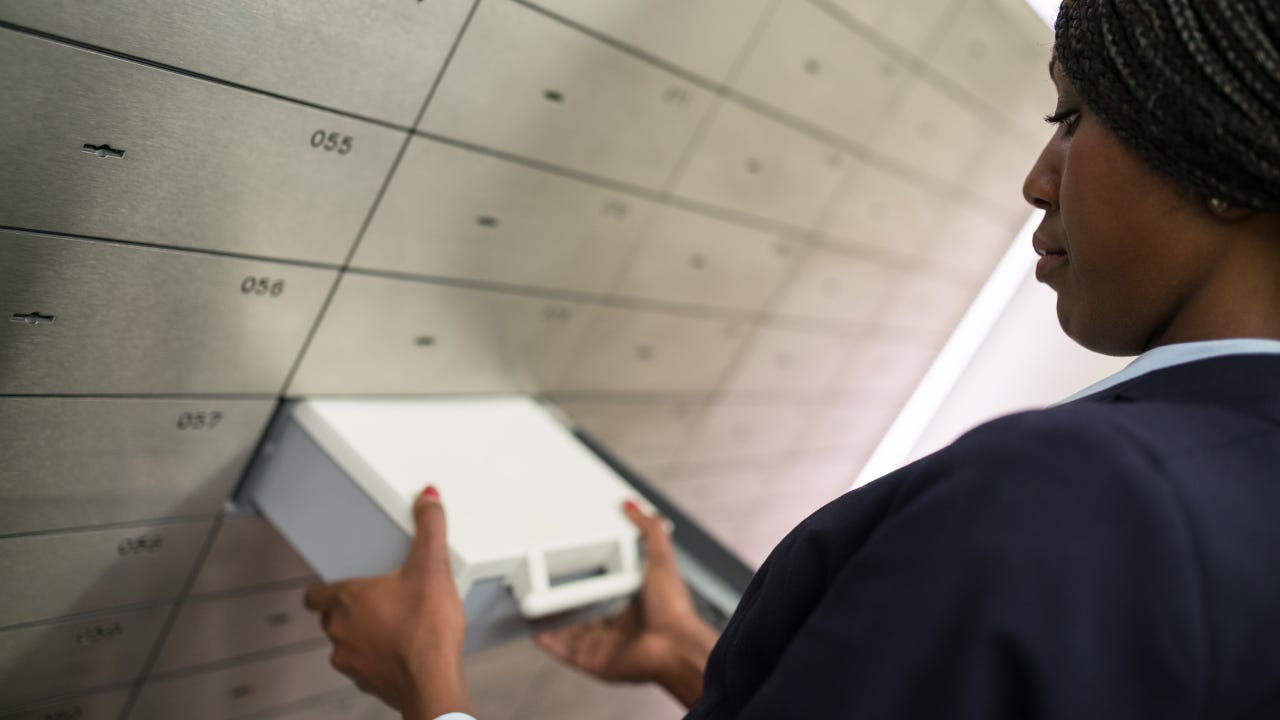What you should (and shouldn’t) store in a safe deposit box

The Bankrate promise
At Bankrate we strive to help you make smarter financial decisions. While we adhere to strict , this post may contain references to products from our partners. Here's an explanation for .
Key takeaways
- Items that are difficult or impossible to replace, such as important documents and family heirlooms, are ideal for safe deposit boxes.
- It is not advisable to store items that may be needed quickly or in an emergency in a safe deposit box.
- Safe deposit boxes are not insured by the institution or the government, so it is important to purchase separate insurance for the contents stored inside.
With the growth of digital banking, renting a safe deposit box isn’t as common as it used to be. Some brick-and-mortar banks have either quit offering them or they’re scaling back. Still, safe deposit boxes can be a good place to keep important personal documents, collectibles and family heirlooms.
It’s important to make informed decisions about which things to store in a safe deposit box. Items that you might need to access quickly, for example, shouldn’t be stored in a safe deposit box.
Here’s what you need to know about, and what to consider, when renting a safe deposit box.
What is a safe deposit box?
A safe deposit box is a secure container, usually made of metal, that’s used to store valuables at a bank or credit union. These boxes are often kept in vaults and can be rented by bank customers for a fee.
Modern safe deposit boxes have been around since the mid-1800s. Some banks today consider them an outdated service and have stopped offering them. But there’s still a demand for them, says David P. McGuinn, a former banker, and president and founder of Safe Deposit Specialists, a Houston-based safe deposit training and consulting firm.
Recently, some financial institutions have started offering virtual safe deposit boxes, where customers can securely store digital copies of important documents, such as birth certificates, last wills and tax records.
Average cost of a safe deposit box
The cost depends on the size of the box, your bank and your region. Expect to pay as little as $15 a year up to about $150 a year.
The fee increases when you rent a larger safe deposit box. So, if the bank charges $1 per square inch, a 10-by-10-inch box should cost about $100 a year.
Some banks may offer discounts on the safe deposit box cost if you have a relationship with the bank. U.S. Bank, for example, offers 50 percent off its annual safe deposit box rental fee for Premium and Pinnacle customers.
Here is a sampling of what financial institutions charge to rent safe deposit boxes:
| Bank name | State | Annual cost of safe deposit box | Box size |
|---|---|---|---|
| Community First National Bank | Kansas | $35-$100 | Ranging from 3-by-10 inches to 10-by-10 inches. |
| First Service Federal Credit Union | Ohio | $25-$75 | Ranging from 3-by-5 inches to 10-by-10 inches. |
| First Bank & Trust Co. | Oklahoma | $15-$150 | Ranging from 2-by-5 inches to 10-by-14 inches. |
| Lake City Federal Bank | Minnesota | $25-$70 | Ranging from 3-by-5 inches to 10-by-10 inches. |
What should go in a safe deposit box
When considering what to store in a safe deposit box, it’s best to opt for items you can’t replace and ones that require safe keeping. However, these items should not be things you might need quickly.
Items to consider for a safe deposit box:
- Birth, death and marriage certificates
- Property deeds
- Car titles
- Stamp or coin collections
- Jewelry
- Paper stocks and bond certificates
- Contracts and business papers
A bank will have a rental agreement specifying what items you can’t store. There may also be a limit to the amount of items you can store in the box as well.
What should not go in a safe deposit box
There are many items you should leave out of your safe deposit box. Since you can only access your safe deposit box when the bank is open, you want to avoid choosing anything you would need in a timely manner.
Some examples are:
- Letters of instruction, such as burial instructions
- Power of attorney documents
- Medical directives
- Passports
- Living wills
- Emergency cash
- Uninsured valuables
- Spare keys to your home, car or other item
Any documents and items you could potentially need urgently should be avoided.
Pros and cons of using a safe deposit box
Before making a decision to rent a safe deposit box, consider the benefits and potential downsides.
Pros
- High level of security: Safe deposit boxes are highly secure, stored in closed off areas of financial institutions with advanced surveillance.
- Environmental protection: They can protect your valuables from environmental damage, such as a flood or fire.
- Privacy: Only you and anyone you authorize have access to the contents of your box.
Cons
- Limited access: You can only access your safe deposit box during the institution’s business hours.
- Fees: There’s a yearly fee associated with maintaining a box. Other options, such as home safes, have only a one-time cost.
- Potential legal complications: If not handled correctly, there could be legal issues in accessing the box, particularly after the death of the owner.
- Not insured by the bank: Banks offer deposit account insurance but usually not insurance for safe deposit boxes. You may need to purchase separate insurance if the items in the box are highly valuable.
- Extra fees for lost keys. If you lose a key, you may have to pay an extra fee for replacement.
Are my belongings insured like my bank account?
A safe deposit box lives within the vault of a federally insured bank or credit union. But whatever you put inside that box isn’t insured by the institution or the government.
The Federal Deposit Insurance Corp. (FDIC), for example, protects only the money in FDIC-insured checking, money market and savings accounts, and certificates of deposit. Furthermore, there are no federal laws stating that customers must receive any form of payment when an item is damaged or stolen.
If you want insurance on the items in the box, you must purchase it yourself — and it’s worth considering: You could lose valuables stored in a bank vault after a natural disaster.
Consider adding a special policy to your home insurance policy or contents insurance policy to cover valuable items. Whether it’s your diamond tiara or a collection of rare magazines, your home insurance agent can write a separate policy, called a rider.
Insurers will often give you a premium discount for storing valuable possessions in a safe deposit box. “Sometimes premiums drop by as much as 50 percent if you tell them it’s in a secure vault,” McGuinn says.
A personal articles floater can be added to your homeowners or renters insurance policy, McGuinn says. Another option is finding a company that specializes in providing policies for safe deposit box contents.
FAQs about safe deposit boxes
-
The rules for what happens to the contents of a safe deposit box depend on state law or the rental contract with the bank, McGuinn says. “In most states, the state law says surviving renters have rights of access.”
In some cases, the safe deposit box may be opened after the holder’s death to look for relevant documents, such as a will or life insurance policies. In New York state law, for example, a court may order a safe deposit box to be opened after the holder’s death if it has reason to believe that the box contains a will, deed or insurance policy.
-
Generally, third parties can’t access your safe deposit box unless you’ve given them authorized access (such as by giving them a key and adding their name to the rental agreement).
If you don’t pay the annual fee for the safe deposit box, it may be classified as abandoned and transferred to the state, in which case law enforcement agencies might be granted access.
-
If rent isn’t paid on a safe deposit box or it’s deemed abandoned after a specific period of inactivity, the bank might drill the box and move the contents to their vault.
Eventually, if the contents remain unclaimed, they’ll have to be turned over to the state. Typically, a financial institution will turn over abandoned property after three to five years, according to the FDIC.
Bottom line
When choosing a bank or credit union to rent a safe deposit box from, consider prices, sizing and whether the institution’s safe deposit box policies abide by state laws and procedures.
Think carefully about what you store in the safe deposit box. It’s important to avoid keeping items in the box that would lead to trouble if they couldn’t be quickly accessed.
— Bankrate’s Sheiresa McRae Ngo contributed to an update of this story.
Related Articles



